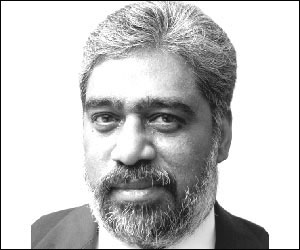Opinion India and the Third Parties: From Miliband to Holbrooke
C. Raja Mohan | RAJA-MANDALA<br>Mention the word 'third party' in the context of Pakistan or Kashmir and India gets hot under the collar. Over the last few days,we saw New Delhi mercilessly hammer the British Foreign Secretary Foreign Secretary David Miliband for his comments (childish?) on Kashmir.

Mention the word ‘third party’ in the context of Pakistan or Kashmir and India gets hot under the collar. Over the last few days,we saw New Delhi mercilessly hammer the British Foreign Secretary Foreign Secretary David Miliband for his comments (childish?) on Kashmir.
As South Block seethed with outrage,a conservative British columnist had a better way of putting down Miliband,by calling him the ‘Mr. Bean’ of British diplomacy.
Whether it was deliberate or knee-jerk,India’s harsh treatment of Miliband may have had some effect in Washington. As the Chinese proverb goes,”kill the
In a Washington ceremony last Thursday announcing the appointment of the tough negotiator,Richard Holbrooke,as the special representative for Afghanistan and Pakistan,the new U.S. Secretary of State,Hillary Clinton,did not mention India or Kashmir.
That does not mean that the Obama Administration has given up on its assessment that Afghanistan can be stabilised only through fixing Pakistan and its problems to the east with India.
There should be no doubt that Indo-Pak relations would inevitably figure in Holbrooke’s South Asia mission. For the American stakes in Afghanistan and Pakistan are just too high.
If the monkey is not scared away,what then for New Delhi? Before answering that question,let me put New Delhi’s rejectionist mantra on third party involvement in perspective.
It was India that took the Kashmir dispute to the United Nations after independence. India let the World Bank conduct the Indus Water Treaty negotiations with Pakistan. It agreed to Russian mediation in Tashkent after the 1965 war with Pakistan.
In India’s Kargil war with Pakistan in 1999,and the military tensions with Pakistan following the terror attack on Parliament on December 13,2001,Prime Minister Atal Bihari Vajpayee found ways to leverage American diplomacy to India’s advantage.
While opposing American ‘mediation’,Vajpayee said,he had no problems with what he called the U.S. ‘facilitation’. Statecraft,after all,is not about an inflexible slogan but about judging a situation and finding the right approach.
On the Holbrooke mission,New Delhi should ask Washington a simple question,”What’s in it for me?” If India can gain from the Obama initiative in South Asia,it should offer full cooperation to Holbrooke. If it does not,New Delhi needs no lessons either in the tactics of stone-walling or the more devious diplomatic art of spinning its interlocutors on a merry go around.
(C. Raja Mohan is a Professor at the S. Rajaratnam School of International Studies,Nanyang Technological University,Singapore)





